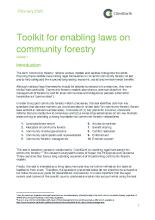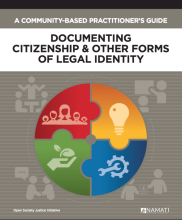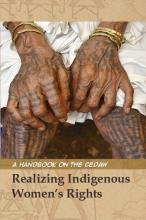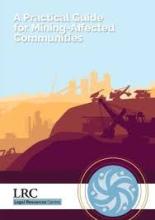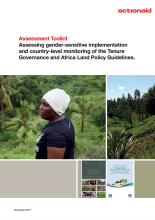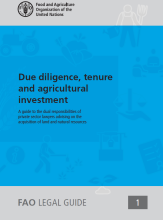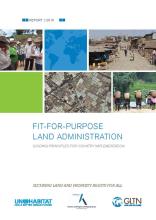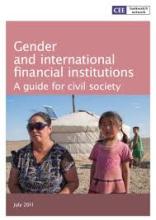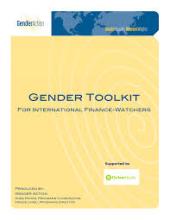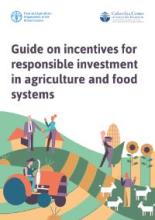Resources for Legal advice
Toolkit for enabling laws on community forestry
This toolkit identifies common key questions that decision-makers can use to develop or review laws on community forestry. It consists of key points for inclusive, consistent reforms that are conductive to consensus and a series of questionnaires on ten key thematic areas aiming at providing a strong foundation for community forestry-related laws: Land and forest tenure, Allocation of community forests, Community internal governance, Community participation and representation, Community forestry management, Access to markets, Benefit sharing, Conflict resolution, Enforcement and External support.
A Community-Based Practitioner’s Guide: Documenting Citizenship and Other Forms of Legal Identity
This guide provides step-by-step instructions on establishing and operating a paralegal or other community-based program to help people obtain legal identity documents. It is primarily for people designing and managing community-based paralegal projects to help clients access documentary proof of citizenship and other forms of proof of legal identity, such as birth certificates. However, it will also be useful to those undertaking legal aid, litigation, and non-litigation advocacy work, as the issues that it seeks to address frequently lie at the intersection of laws and how they are applied in practice.
A Handbook on the CEDAW: Realizing Indigenous Women's Rights
This handbook is an introduction to the human rights of indigenous women. It provides some detail on the CEDAW as the only instrument specifically for women. It also provides a brief overview of the other available human rights mechanisms.
A Practical Guide for Mining-Affected Communities
This guide seeks to highlight the steps that concerned parties and communities can take to address the challenges that mining poses on communities. It gives communities the tools they need to understand the law that governs mining and to protect their rights. Although it focuses on South Africa, the tools proposed will be relevant for communities facing similar issues in other countries.
This resource is part of the CCSI’s Directory of Community Guidance on Agreements Relating to Agriculture or Forestry Investment.
Assessment Toolkit: Assessing gender-sensitive implementation and country-level monitoring of the Tenure Governance and Africa Land Policy Guidelines
This gender-sensitive toolkit enables civil society organisations, women and communities, as well as other actors to assess each country’s current legal framework and tenure governance arrangements in line with the provisions of the VGGTS and the AU F&G.
Due diligence, tenure and agricultural investment. A guide to the dual responsibilities of private sector lawyers advising on the acquisition of land and natural resources
This guide examines the role and responsibilities of private sector lawyers when advising their clients on agricultural investments. It discusses how lawyers can prevent and/or address and mitigate adverse human rights impacts on holders of legitimate tenure rights when advising on or conducting their due diligence and risk assessment processes on behalf of their clients. It provides a number of key recommendations, including on how to align legal advice with the VGGT and CFS-RAI.
Fit-for-Purpose Land Administration: Guiding Principles for Country Implementation
The guide proposes guiding principles to build Fit-For-Purpose land administration systems in order to deliver benefits, including secure tenure rights, to a wide range of stakeholders. It provides structured guidance on building the spatial, legal and institutional frameworks in support of designing country-specific strategies for implementing FFP land administration. It contains the analysis and operational advisory guidelines to implement the approach.
Gender and international financial institutions. A guide for civil society
The guide consists of an overview of the gender relevant policy framework and initiatives at IFIs. It also contains a gender checklist which should help civil society organisations in determining whether gender considerations have been addressed during the preparation and implementation of IFI-financed projects and programmes. The checklist is divided into three parts:
• broad gender considerations during the project/programme preparation, monitoring and evaluation stages,
• gender issues that need to be addressed during the assessment of projects in particular sectors
• an overview of gender assessment tools, different methodologies and gender sensitive indi- cators.
Gender Toolkit for International Finance Watchers
This toolkit aims to give civil society organizations the tools they need to address gender justice issues in their work. The toolkit contains sections on:
- Gender Concepts (terms, frameworks and key debates);
- Gender Action Links (topical briefings and action resources);
- Gender Tools (checklists, indicators and methodologies for gender analysis in specific sectors); and
- Gender Data (links to sex-disaggregated databases).
All sections contain electronic hyperlinks to a vast array of available gender resources.
Guide on incentives for responsible investment in agriculture and food systems
Increased investment in agriculture and food systems—from both the private and public sectors—is critical to enhance food security and nutrition, reduce poverty, and adapt to climate change. To generate sustainable benefits, this investment must be responsible. What role should investment incentives play in encouraging such investment? This Guide helps to answer that question. Specifically, the Guide provides policymakers and government technical staff with guidance on how investment incentives can be used (and how they should not be used) to enhance responsible investment in agriculture and food systems. The Guide provides an overview of responsible investment in agriculture and food systems; examines common types of incentives; offers general considerations on how incentives can be used; and discusses how to plan for, design, monitor, and evaluate investment incentives for responsible investment in agriculture and food systems.


